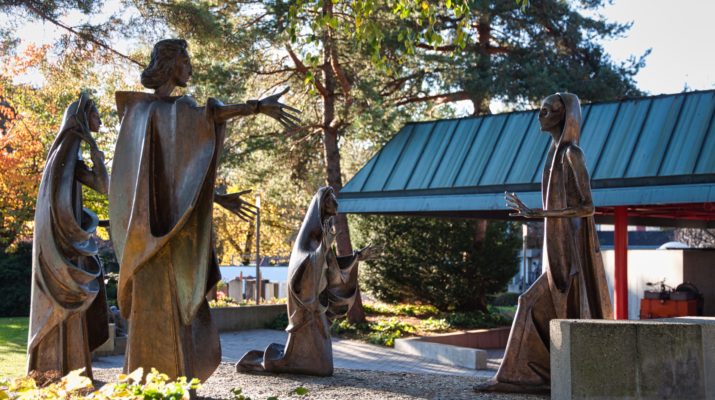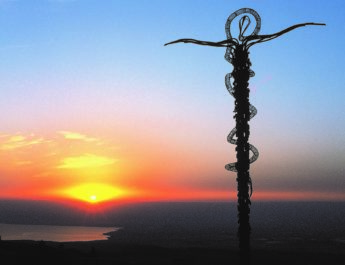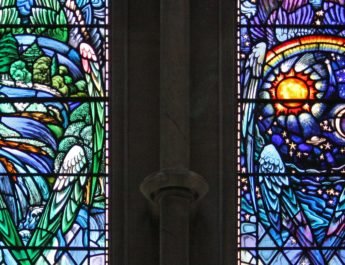John 11:17-27
A Women’s Lectionary – Sixth Sunday of Easter
17 When JesusA arrived,B he foundC
A “Jesus” = Iesous. From Hebrew Yehoshua (Joshua, the Lord is salvation); {from YHVH (proper name of the God of Israel; the self-existent and eternal one); {from havah (to become) or from hayah (to come to pass, become, be)} + yasha (to deliver, defend, help, preserve, rescue; properly, to be open, wide or free, which implies being safe. So, in a causative sense, this is to free someone)}. This is Jesus or Joshua in Greek – the Lord saves or the Lord is salvation.
B “arrived” = erchomai. This is to come or go.
C “found” = heurisko. This is to find, learn, or obtain. It is to discover something, which generally implies a period of searching for it. This is to find in a literal or figurative sense. This is where the word “heuristic” comes from.
that Lazarus had already beenD in the tombE fourF days.G
D “been” = echo. This is to have, hold, possess.
E “tomb” = mnemeion. From mousikos (to remember); from mneme (memory or mention); from mnaomai (to remember; by implication give reward or consequence); perhaps from meno (to stay, abide, wait, endure). This is properly a memorial – a tomb, grave, monument.
F “four” = tessares. This is four – used figuratively for total coverage.
G “days” = hemera. Perhaps from hemai (to sit). This is day, time, or daybreak.
18 Now BethanyH was nearI Jerusalem,J some two milesK away,
H “Bethany” = Bethania. 12x in NT. From Aramaic beth anya (house of affliction, misery, wretchedness). This is Bethany.
I “near” = eggus. Perhaps from agcho (to squeeze). This is nearby or near in time.
J “Jerusalem” = Hierosoluma. From Hebrew yerushalaim (probably foundation of peace); {from yarah (to throw, shoot, be stunned; to flow as water so figuratively to instruct or teach) + shalam (to make amends, to be complete or sound)}. This is Jerusalem, dwelling of peace.
K “two miles” = stadion + dekapente. Literally, “fifteen stadia.” Stadion is 7x in NT. From the same as histemi (to stand, place, establish, appoint, stand ready, be steadfast). This is a stadium, which was a unit of length. By implication, this would refer to a racing track for a foot race. Dekapente is 3x in NT. From deka (ten or -teen) + pente (five). This is fifteen.
19 and manyL of the JewsM had comeN to MarthaO
L “many” = polus. This is much, often, plenteous – a large number or a great extent.
M “Jews” = Ioudaios. From Ioudas (Judah, Judas); from Hebrew Yehudah (Judah, son of Jacob, his tribal descendants, a name for the southern kingdom. Literally, it means praised); probably from yadah (to throw one’s hands into the air in a gesture of praise); from yad (hand). This is Jewish, a Jew, or Judea.
N “come” = erchomai. Same as “arrived” in v17. See note B above.
O “Martha” = Martha. 13x in NT. From Aramaic marta (mistress, lady); from mar (master). This is Martha. See also https://en.wikipedia.org/wiki/Martha_(given_name)
and MaryP to consoleQ them about their brother.R
P “Mary” = Maria. From Hebrew Miryam (Aaron and Moses’s sister); from marah (to be contentious, rebellious, bitter, provoking, disobedient; to be or make bitter or unpleasant; figuratively, to rebel or resist; causatively to provoke). This is Miriam or Mary.
Q “console” = paramutheomai. 4x in NT. From para (from beside, by, alongside of) + mutheomai (to speak); {from muthos (speech, story, myth, tale); perhaps from the same as mueo (to initiate someone into the secrets or mysteries of an order; to instruct learn, be disciples; properly, shutting your mouth and eyes to experience mystery); from muo (shutting eyes or mouth)}. This is comforting in a sympathetic or encouraging way. It could also be to console or exhort.
R “brother” = adelphos. From a (with, community, fellowship) + delphus (womb). This is a brother in a literal or figurative sense. It is also used of another member of the Church.
20 When Martha heardS that Jesus was coming, she went and metT him, while Mary stayedU at home.V
21 Martha said to Jesus, “Lord,W if you had been here, my brother would not have died.X
S “heard” = akouo. This is hear or listen, but it also means to understand by hearing. This is where the word “acoustics” comes from.
T “went and met” = hupantao. 10x in NT. From hupo (by, under, about, subordinate to) + antao (to meet with personally) OR from hupo (see above) + anti (opposite, instead of, against). This is to encounter someone or to go to meet them.
U “stayed” = kathezomai. From kata (down, against, according to, among) + hezomai (to sit); {from aphedron (a seat, a base). This is to sit down or be sitting.
V “home” = oikos. This is house – the building, the household, the family, descendants, the temple.
W “Lord” = Kurios. From kuros (authority, supremacy). This is a respectful address meaning master or sir. It refers to one who has control or power greater than one’s own. So, it was also applied to God and Jesus as Master or Lord.
X “died” = apothnesko. From apo (from, away from) + thnesko (to die, be dead). This is to die off. It is death with an emphasis on the way that death separates. It can also mean to wither or decay.
22 But even now I knowY that GodZ will giveAA you whatever you askBB of him.”CC
Y “know” = eido. This is to know, consider perceive, appreciate, behold, or remember. It means seeing with one’s eyes, but also figuratively, it means perceiving – seeing that becomes understanding. So, by implication, this means knowing or being aware.
Z “God” = Theos. Same as “him” in v22. See note CC below.
AA “give” = didomi. To give, offer, place, bestow, deliver. This is give in a literal or figurative sense.
BB “ask” = aiteo. This is to ask, demand, beg, desire.
CC “him” = Theos. From Proto-Indo-European origins, meaning do, put, place. This is God or a god in general.
23 Jesus said to her, “Your brother will rise again.”DD
24 Martha said to him, “I know that he will rise again in the resurrectionEE on the lastFF day.”
DD “rise again” = anistemi. Related to “miles” in v18. From ana (upwards, up, again, back, anew) + histemi (see note K above). This is to raise up, rise, appear. It is to stand up literally or figuratively. Can also mean to resurrect.
EE “resurrection” = anastasis. Related to “miles” in v18 & “rise again” in v23. From anistemi (see note DD above). This is literally standing up or standing again. It is used figuratively for recovering a spiritual truth. It can be raising up, rising, or resurrection.
FF “last” = eschatos. Related to “been” in v17. Related to eschaton (end, last); perhaps from echo (see note D above). This is last, end, extreme, final. It is often used to discuss the end times, prophecies of the future, and the afterlife. The branch of theology focusing on all these topics is called “eschatology.”
25 Jesus said to her, “I am the resurrection and the life.GG Those who believeHH in me, even though they die, will live,II 26 and everyoneJJ who lives and believes in me will neverKK die. Do you believe this?”
GG “life” = zoe. From zao (to live, be alive). This is life including the vitality of humans, plants, and animals – it is life physical and spiritual and life everlasting.
HH “believe” = pisteuo. From pistis (faith, faithfulness, belief, trust, confidence; to be persuaded or come to trust); from peitho (to have confidence, urge, be persuaded, agree, assure, believe, have confidence, trust). This is to believe, entrust, have faith it, affirm, have confidence in. This is less to do with a series of beliefs or doctrines that one believes and more to do with faithfulness, loyalty, and fidelity. It is trusting and then acting based on that trust.
II “live” = zao. Related to “life” in v25. See note GG above.
JJ “everyone” = pas. This is all or every.
KK “never” = ou + me…eis + ho + aion. Literally, “not to the age.” Aion is from the same as aei (ever, always, unceasingly, perpetually; on every occasion). This is an age, cycle of time, course, continued duration. It is also used to describe the eternal or forever. This is the word used to discuss the present age or the messianic age.
27 She said to him, “Yes,LL Lord, I believe that you are the Messiah,MM the SonNN of God, the one coming into the world.”OO
LL “yes” = nai. This is yes, truly, indeed. It is a strong affirmation.
MM “Messiah” = Christos. From chrio (consecrate by anointing with oil; often done for prophets, priests, or kings). Literally, the anointed one, Christ. The Greek word for Messiah.
NN “Son” = huios. This is son, descendant – a son whether natural born or adopted. It can be used figuratively for other forms of kinship.
OO “world” = kosmos. Perhaps from the base of komizo (to carry, convey, recover); from komeo (to take care of). This is order, the world, the universe, including its inhabitants. Literally, this is something that is ordered so it can refer to all creation. It can also refer to decoration in the sense that something is better ordered and, thus, made more beautiful. This is where “cosmos” and “cosmetics” come from.
Image credit: “Revival of Lazarus” by Albert Wider, 1973. Photo by Martin Thurnherr, 2021.




